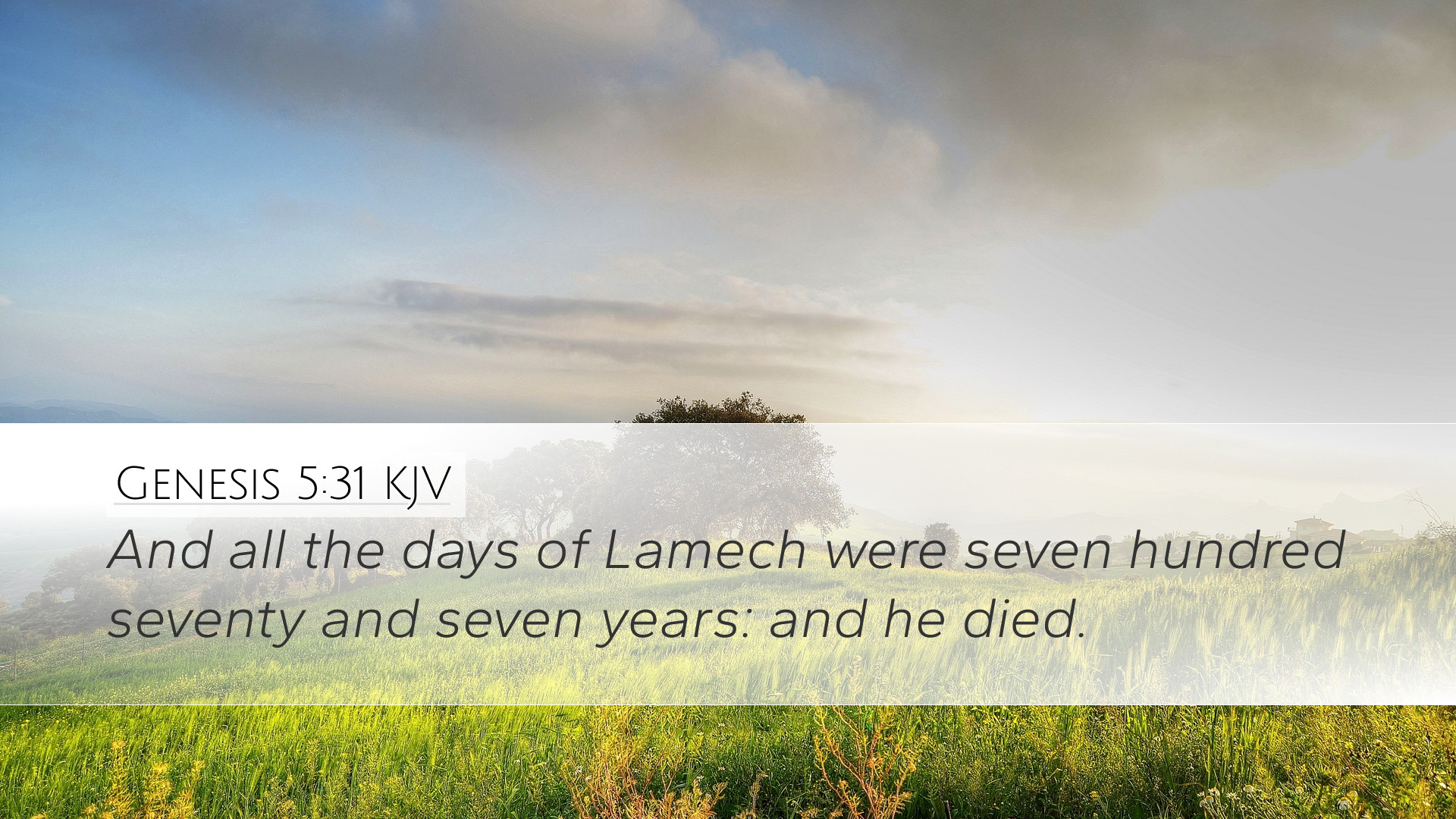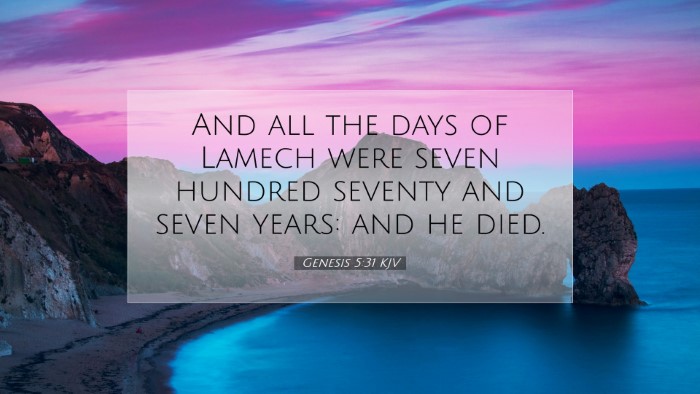Commentary on Genesis 5:31
Genesis 5:31 states: "And all the days of Lamech were seven hundred seventy and seven years: and he died."
This verse concludes the genealogy of Adam through Seth and introduces significant insights regarding the character of Lamech,
as well as themes of human mortality, the passage of time, and God's overarching narrative throughout Scripture.
Overview of the Context
The genealogical account in Genesis 5 is crucial for understanding the lineage leading to Noah, which is pivotal
for the narrative of the flood and humanity's redemption. The brevity of this verse belies its importance in highlighting
not only the life span of Lamech but also foreshadowing the impending judgment upon humanity due to sin.
Insights from Public Domain Commentaries
Matthew Henry's Commentary
Matthew Henry notes the significance of Lamech’s age and death within the genealogy.
He emphasizes that Lamech lived 777 years, which could symbolize completeness or perfection,
as the number seven often does in biblical literature. Henry suggests that this reflects not only a full life
but also a life lived in a world increasingly estranged from God. Lamech’s life stands as a marker of human
longevity during the antediluvian period, a time of great spiritual decline.
The Symbolism of 777 Years
The total of seven hundred seventy-seven years can be interpreted as a symbolic representation of
a complete cycle or culmination of human history leading up to Noah. The number seven is repeated,
which could indicate the fullness of both life and the impending judgment that will come through the flood.
Albert Barnes' Commentary
Albert Barnes provides a more historical and theological perspective, highlighting that Lamech
is pivotal not just for his longevity but also for the number of generations preceding him. Barnes notes
that Lamech's name means "despair," suggesting a shift in the trajectory of humanity from hope to sorrow.
His death marks one fewer bearer of the promise that God would remain sovereign and merciful amid sin.
Reflection on Death
Barnes reflects on the certainty of death, presenting it as a universal truth that echoes throughout Scripture.
The mention that “he died” serves as a sobering reminder of humanity's fallen state and the reality of mortality
for every individual, encapsulating the pervasive nature of sin that brings death into the world.
Adam Clarke’s Commentary
Adam Clarke offers an exploratory insight into Lamech's name and its connotations. He states that the
significance of Lamech’s long life is underscored by the fact that he is remembered in the Bible primarily not
for his accomplishments but for his demise, which is a stark contrast to the hope of earlier patriarchs.
Clarke suggests that Lamech's life could also reflect the tension between human longevity and divine judgment.
The Legacy of Lamech
Clarke mentions that unlike earlier figures in the genealogy who walked with God, Lamech’s
legacy does not seem to carry this divine fellowship. His long life does not equate to favor in God’s eyes,
signifying a departure from the righteousness that characterized earlier generations. This is symptomatic
of a world increasingly alienated from divine purpose.
Theological Implications
This verse serves to emphasize the persistence of sin in the post-fall world and the ultimate fate all
humans share in death. As Lamech lived in a time shortly before the flood, his death is not just an end;
it is also a precursor to the great trial to come. The genealogy serves as a stark reminder of the
generational decay of human morality leading up to God's judgment.
Mortal Reality
The death of Lamech reminds believers of the finality of life and the certainty of death—an essential
teaching throughout Scripture that points towards the need for redemption and the hope of resurrection.
This connects to the New Testament themes where death is not seen as an end but as a transition into hope
through Christ.
Conclusion
Genesis 5:31 encapsulates profound truths about human existence, mortality, and the divine plan.
Through the lens of commentaries by Matthew Henry, Albert Barnes, and Adam Clarke, we can gather a
richer understanding of the importance of this verse in the context of biblical history. The life and
death of Lamech serve as a testimony to the enduring nature of God’s promises, the reality of human
frailty, and the prophetic movement toward the necessity of God's redemptive work in the world.


